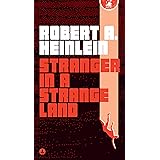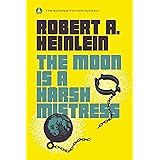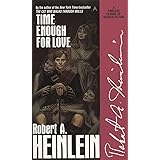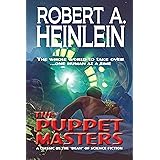
Download the free Kindle app and start reading Kindle books instantly on your smartphone, tablet, or computer - no Kindle device required.
Read instantly on your browser with Kindle for Web.
Using your mobile phone camera - scan the code below and download the Kindle app.

OK
 Audible sample Sample
Audible sample Sample 


I Will Fear No Evil (Library Edition) Audio Cassette – Unabridged, April 1, 2011
As startling and provocative as his famous Stranger in a Strange Land, here is Heinlein's grand masterpiece about a man supremely talented, immensely old, and obscenely wealthy who discovers that money can buy everything.
Johann Sebastian Bach Smith was immensely rich -- and very old. Though his mind was still keen, his body was worn out. His solution was to have surgeons transplant his brain into a new body. The operation was a great success -- but the patient was no longer Johann Sebastian Bach Smith. He was now fused with the very vocal personality of his gorgeous, recently deceased secretary, Eunice -- with mind-blowing results! Together they must learn to share control of her body.
- Print length19 pages
- LanguageEnglish
- PublisherBlackstone Audio, Inc.
- Publication dateApril 1, 2011
- Dimensions6.75 x 2.25 x 9.75 inches
- ISBN-101441740538
- ISBN-13978-1441740533
The Amazon Book Review
Book recommendations, author interviews, editors' picks, and more. Read it now.
Similar items that may deliver to you quickly
Editorial Reviews
Review
''Those who have thought of science fiction as only child's play will see how wrong they are.'' -- Detroit Free Press
''One is left with the feeling that he has been in the presence of a master!'' --National Observer
About the Author
Product details
- Publisher : Blackstone Audio, Inc.; Unabridged LIBRARY edition (April 1, 2011)
- Language : English
- Audio Cassette : 19 pages
- ISBN-10 : 1441740538
- ISBN-13 : 978-1441740533
- Item Weight : 1.55 pounds
- Dimensions : 6.75 x 2.25 x 9.75 inches
- Customer Reviews:
About the author

Robert Heinlein was an American novelist and the grand master of science fiction in the twentieth century. Often called 'the dean of science fiction writers', he is one of the most popular, influential and controversial authors of 'hard science fiction'.
Over the course of his long career he won numerous awards and wrote 32 novels, 59 short stories and 16 collections, many of which have cemented their place in history as science fiction classics, including STARSHIP TROOPERS, THE MOON IS A HARSH MISTRESS and the beloved STRANGER IN A STRANGE LAND.
Customer reviews
Customer Reviews, including Product Star Ratings help customers to learn more about the product and decide whether it is the right product for them.
To calculate the overall star rating and percentage breakdown by star, we don’t use a simple average. Instead, our system considers things like how recent a review is and if the reviewer bought the item on Amazon. It also analyzed reviews to verify trustworthiness.
Learn more how customers reviews work on Amazon-
Top reviews
Top reviews from the United States
There was a problem filtering reviews right now. Please try again later.
On top of that Heinlein creates a slightly future world we can actually envision as we're not too far from there now. That he did this 40 years before it happened adds to his mythos of having prescience.
Those who aren't open-minded won't appreciate this book for the phenomenal writing & ideas within.
To put this book in context, Heinlein was suffering from terrible peritonitis while he wrote it. The final product came out very repetitive with a bunch of filler, with obnoxious attempts to charm the reader that fall disappointingly flat (I don't ever want to see the term "money hum" again).
However this book gives a great deal of insight into Heinlein's writing process. Heinlein trudged through this piece, despite his illness to keep himself in work, a reader can analyze his methods of adding filler and his attempts to charm the reader. He still unflinchingly explores a unique science fiction concept, but the end result could use to be more cohesive.
So it really depends on what you're looking for in a work. If you're looking for a good novel, this book will disappoint, but if you want a special opportunity to observe the malfunctioning writing process of a genius, this will offer a rare peek into that.
It's a fascinating concept and the book goes into a lot of detail about sexual identity. From reading this book, and from some subsequent movies (Switched?), it appears that the general consensus is if one's brain is switched to the opposite gender one should take up that person's new gender. Whew, I guess that's clears up that worry for all of us waiting for that brain transplant at the end of our days. So if a heterosexual male's brain gets transplanted into a females body, it should take up female heterosexuality. (Hmmm, what if a male homosexual's brain gets transplanted into a female, does that person become lesbian... hey, maybe there is room here for another book.) There's nothing here written though about the section of the female brain that regulates female hormones (the pituitary gland?) and that it would have to remain from the original brain for the possibility of transfer to be successful. There is quite a bit written on what is the person's actual identity (with regards to financial ownership) and what constitutes death. It's interesting to note Heinlein references a court decision from 1976, which is in the future of when the book was written, thus fictitious.
The main problem is that the book is 2^9 pages long. There's a trend here I noticed on Amazon's review pages that when someone trashes a book or an author they really liked, they automatically click the Not Helpful button, no matter how well the person has articulated why they didn't like the book, and of course that's every person's right. For this book I would recommend reading the negative reviews to get an idea of what you would be in store for. For me, I found the book dragging at about pg 300 or so when Joan goes into the names of her household's entourage, and their first names, and I was constantly go back and forth to know what name belong to who. I have a lot of books on my reading list and this section was really unimportant. When you get to these sections I suggest just plowing through them and any Olga's or unknown names you see later is somebody's wife and doesn't really matter for the story. For all the pages Heinlein dedicates to establishing identity, he does little on how the previous bodies spirit comes to co-share the new mind. Since there's no brain matter left, how does it get there. This open the entire immense field of `is there a soul', but is overlooked. In fact at the end there's a question of whether Joan just imagined it. It's difficult to know, because almost the entire novel is from her perspective and it's said that crazy people don't know that they're crazy.
The general consensus from having read the other reviews, and I concur, is that if you're new to Heinlein, other books of his are recommended. I've read `only' 6 Heinlein novels (now 7) and I'm still considered a relative novice, but a good site is [...] on where to start. If you're one of the Heinlein legions and have to read everything he's written, well then, you'll eventually have to get to this novel, it's only a matter of when. If you're in the third category, as I am, and find the concept interesting and would read anything anyone has written on it, then this is the book. However, it is long on sexual dialogue, and sure, it can seem interesting and at times are, it's just overdone. I didn't generally find the book dated, the hippy slang, maybe it's too old, I just didn't recognize it. Only towards the ending when they were sailing, which was the hip 60's thang, did it seem dated to me and gave it a feel like the ending of the movie "The Way We Were" or something.
The things I really liked about this novel are the details, the items that didn't cover sexual banter. For instance when Joan is shopping she stops when she's hungry, because from her experience from the Great Depression, she equates hunger with being poor and thus doesn't want to spend money. The prose Heinlein writes here is short but powerful and it feels like Heinlein is himself writing from personal experience. This alone is a moving thought, and there have been a number of high profile movies set in the depression this year (2005) (Cinderella Man, the beginning of King Kong). There's also a section when there's only two eggs left in the kitchen and Joan's experience from the Great Depression enables her to stretch it out (by adding flour, etc) to feed three people. She claims this recipe is courtesy of the W.P.A. I looked up that acronym and sure enough there was (is?) a Works Programs/Projects Administration. It seems during the Great Depression almost everyone was in the same boat, but hunger was prevalent. Hard to imagine today with the record levels of obesity in America. (I bet no science fiction writer saw that coming.)
For those that think this isn't science fiction haven't been reading what's been awarded the Nebula in past years. Faery handbags, magic amulets, Mayan spirits are the norm. This novel in comparison is hard core science fiction. So much has been written on `what is science fiction' that the paper version of them threatens the gravitation rotation of the planet. I would consider this novel to be science fiction, albeit somewhat diluted.
If you want to read a superb Heinlein story that is even more `twisted' in a way than this novel so would give some idea of the identity concepts, but is also a short story so is a quick read AND has one of greatest time travel paradoxes I've ever read, then read `All You Zombies -'.
Top reviews from other countries
Ace; Reissue版 (1987/4/15)
ISBN-10: 0441359175 のレビュー。
レビューとして不適切ですが、半分ほどで止めました。いつまでたっても話が進まないので。
アイディアは、表四の惹句に書かれていることに尽きます。巨大な富を持つ老人が、新しい肉体に脳を移植する。その肉体は、女性だった。ハインライン爺さんは、何歳になっても中学生のような空想を真剣に考える人です。
アイディアは凄いけれど、描写がかったるい。
車椅子と体機能維持装置でかろうじて生きていた老人が、新しく皮膚感覚・味覚・運動能力・性欲を回復するのに、その喜びや感動が希薄なのです。すぐに話は法律問題や(今風の表現だと)ジェンダー問題になります。現代SF的な意識や脳の問題は、ほとんど無視。
でも、ハインライン爺さん、性の問題を描くには頭が古すぎるんですよ。面白くない。とくに、ファッションや肉体の描写、性役割の意識はアメリカの50年代の感じでしらけます。(この作品の発表は1970年)
最後のほうで、意外な展開があるのかもしれませんが、中断してしまいました。すみません。
登場人物の名前の読み方
Eunice = you nice!
Johann Sebastian Bach ドイツ語風、つまりヨハン・セバスチャン。ひょっとして、この話はフーガの技法を使って、何度も元にもどるなんてオチじゃないんでしょうね??










